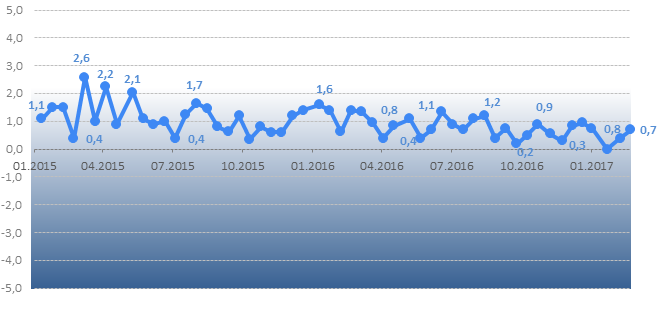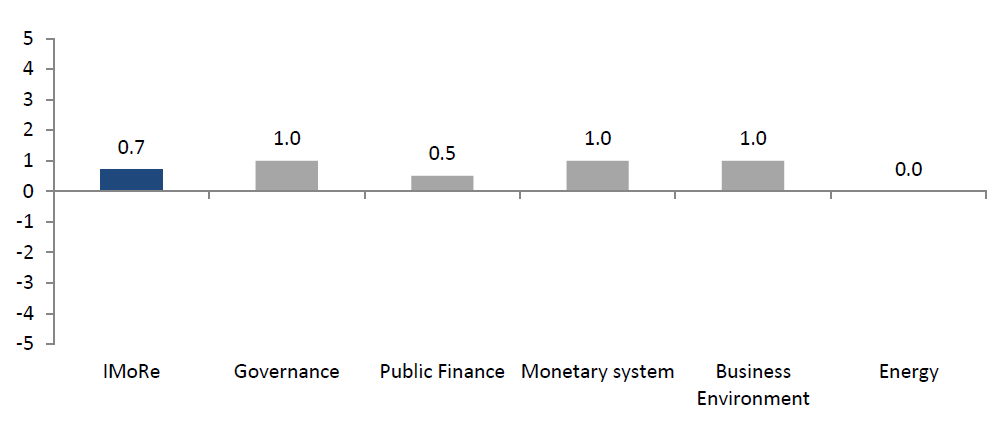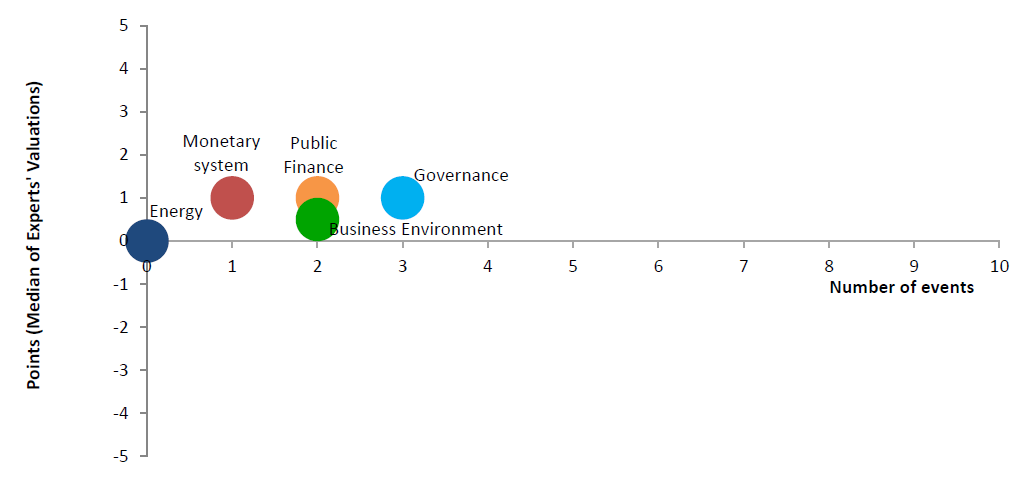Reform Index shows that reforms have slightly intensified. An assessment of the progress of reforms for the period of February 6 – February 19, 2017 is +0.7 points on a scale of -5.0 to +5.0. The shift was recorded in the areas of public administration reform, public finance, the monetary sector and the business environment.
Among the major events that occurred during this round are laws on the implementation of e-ticketing in public transport, the improvement of urban development, transfer of rents for the use of the subsoil in the extraction of oil and gas to local budgets, and the resolution on the abolition of the requirements for certification for the mounting of telecommunications in buildings and structures and on strengthening oversight over the activities of payment systems.
Chart 1. Reform Index dynamics*

* Reform Index team considers index value of at least 2 an acceptable pace of reform
Chart 2. Reform Index and its components in the current round

Top-reforms of the release
The law on the introduction of e-ticketing in public transport, +2.0 points
The current system of public transport fare does not make it possible to assess the real passenger traffic flow on the various routes or the amount of money paid for each trip.
Law №1812-VIII of 17.01.2017 establishes the possibility to introduce an automated system of fare payment. Electronic records will permit assessments of the passenger traffic flow on public transport routes, provide effective planning of routes, convenient payment and trip control, the introduction of a flexible tariff system, and a reasonable upgrade in the planning of the vehicle parks of the carriers.
Calculations of the carriers, including reimbursement of the expenses on the transportation of privileged passengers, will become much more transparent.
Local authorities can now implement an automated system of fare payment and govern its functioning.
They can also adopt rules for the use of public transport and set mandatory provision for the privileged categories of the population with electronic tickets.
Reformer’s Comment
“This law is required for decentralization and European integration. Moreover, it will withdraw certain funds from the shadows. This is also the opportunity for honest carriers who pay taxes, to show the real circulation of money that they have. This is an opportunity not to queue to get some compensation from the state. Now the state can give the ticket to someone who really needs it. Also, this is the first step to monetization, but not just a regular empty promise. These bills are important to society because they will really improve conditions for the passengers’ movement and improve the quality of services.”
– Oksana Yurynets, MP of Ukraine
Expert’s Comment
“The law provides opportunities, but it is important how actively local authorities will implement the law.
Electronic ticket is the possibility to get passenger flow statistics in order to optimize traffic and increase cost efficiency. It will also reduce opportunities for corruption, which may cause resistance in implementing this reform. Another source of resistance may be the reluctance of passengers to change habitual behavior. To overcome the latter, it requires explanatory communication on benefits of e-ticket and decision-making on its implementation with easy usability. List of alternatives is rather wide – from contactless bank cards (NFC), QR codes devices for smartphones to issuing special cards, for example, transport Oyster card in London.”
– Dmytro Yablonovsky, Center for Economic Strategy
Chart 3. Value of іMoRe components and number of events, February 6-19, 2017

The law on the improvement of urban development, +2.0 points
Building permit procedures used to be applied depending on the category of complexity of objects. This formed excellent conditions for abuse from dishonest property developers and excessive regulation for those who really followed the rules.
Law 1817-VIII of 17.01.2017 cancelled complexity categories of construction. The procedure of registration of permits for construction will be determined by the size of the building undergoing decommissioning or the overall loss of floor space.
Construction of private residential buildings, commercial buildings, small business facilities, and storage premises can be started the next day after notice has been received to begin. Construction of objects of medium to large size will be exclusively for the permit system. In particular, large residential complexes, multi-story buildings, social facilities, shopping centres, and office buildings will be built exclusively upon a full package of permits.
These changes will increase the state’s ability to combat illegal building applications that are already at the stage of registration, and will strengthen the responsibility of officials of the State Building Control Committee for their decisions on issuing permits.
The law simplifies the licensing system for objects of small size that make up more than 80% of buildings in Ukraine. It is expected that the implementation of the law will significantly increase Ukraine’s ranking in Doing Business.
Reformers’ Comments
Reform Index editors addressed for comments to MPs Gennadiy Kryvosheya and Vadim Ivchenko, who were a part of the initiators of the bill, but did not receive a response to the release.
Expert’s Comment
“The law improves the conditions for the construction, which is important, considering the low rating of the country in Doing Business in terms of construction permits (140th place) and the expected continuation of expansion in housing construction (+ 13% in 2016). Now, about 4/5 of all construction projects (primarily, small private construction) will not require permits. Protection of the rights of investors in housing construction should also increase as there will be fewer possibilities to begin unauthorized construction. Protection of cultural monuments and historic buildings will rise – the objects with significant consequences (SS3, the highest category) will be classified as monuments of cultural heritage.”
– Alexander Zholud, the editorial board VoxUkraine
Reform Index aims to provide a comprehensive assessment of reform efforts by Ukraine’s authorities. The Index is based on expert assessments of changes in the regulatory environment in five areas: (Please see other charts here and here)
- Governance
- Public Finance
- Monetary system
- Business Environment
- Energy
Attention
The author doesn`t work for, consult to, own shares in or receive funding from any company or organization that would benefit from this article, and have no relevant affiliations



